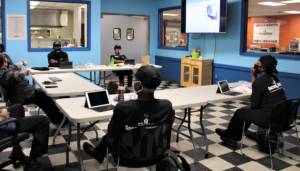After a five-month pause, the Culinary Job Training (CJT) program is back at Second Helpings!
Suspended in mid-March due to COVID-19 precautions, the program’s team has been hard at work planning a new version of the training, which prioritizes safety while still providing students with the same level of preparation and training they need to succeed in the culinary industry and beyond.

CJT Class 130 reviews food safety guidelines on their first day back at Second Helpings
Students from Class 130 (which was paused in their second week of the program in March) returned on August 17 to begin the program again. The structure of the program has changed since they first began earlier this year. Starting with this class:
- CJT classes will be smaller, because with social distancing, the training kitchen can only accommodate 5 students at a time.
- Students will be on-site half days for focused kitchen-based learning.
- Homework and classroom time will be conducted remotely, with Second Helpings providing support to ensure that students have internet access and appropriate devices.
Still, the program will last seven weeks, and upon graduation, students will have developed strong culinary skills (meat and vegetarian cooking, food safety skills, buffet set-up, cook-to-order, and more), as well as skills beyond the kitchen (time management, financial literacy, job search resources, and job interview preparation). Read more about what else this program provides for students.
Developing this variety of crucial skills is more important than ever, explains CJT Employment Specialist Anne King. “Any time we have unemployment rates like this, everything becomes more competitive. The skill level of new students will likely be higher coming in, because they may still be out of work now.”
Ever present, too, is the spirit of the program, surrounding students with the encouragement and support needed to make major changes. “The genuine love and support here at Second Helpings are what some people need most,” says CJT Coordinator Tonya Watson.
While the program was paused, King and Watson assisted current students and displaced graduates hard hit by downsizing and closures in the hospitality industry, sharing employment opportunities, food boxes, transportation assistance, and other resources.
CJT Instructors Chef Keith Brooks and Chef Kyle Burnett, meanwhile, served in the Hunger Relief program, providing additional support for the kitchen staff and leading volunteers, to keep up with the demand for meals, which grew to more than double Second Helpings’ normal operating capacity this spring.
“I already valued our organization, I love our job, but we never really got hands-on” in the Hunger Relief kitchen, Chef Kyle says. “It’s been an eye-opening experience. Now I really understand the depth of the impact that Second Helpings makes, and I’m very thankful for that opportunity.”
Now that the CJT program is running again, our instructors are committed to preparing students for all that lies ahead.
“We are working really hard to make sure that our students are knowledgeable, that they’re punctual and dependable, and understand what the job is going to entail and that it’s not going to be easy,” says Chef Keith. “Our end goal is for our students to become the next chefs.”
